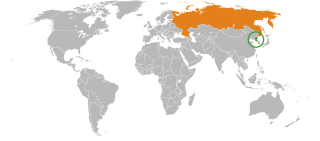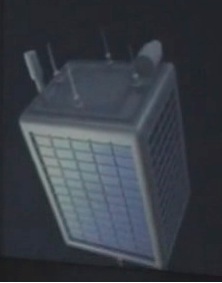The six-party talks aimed to find a peaceful resolution to the security concerns as a result of the North Korean nuclear weapons program. There was a series of meetings with six participating states in Beijing:

Two rounds of North Korean missile tests were conducted on July 5, 2006. The Democratic People's Republic of Korea reportedly fired at least seven separate missiles. These included one long-range Taepodong-2 missile and short-range Scud derived missiles including the enlarged Nodong missile. The Taepodong-2 was estimated by United States intelligence agencies as having a potential range reaching as far as Alaska, although this missile failed after about 42 seconds of flight.

United Nations Security Council resolution 825, adopted on 11 May 1993, called upon the Democratic People's Republic of Korea to reconsider its decision to withdraw from the Treaty on the Non-Proliferation of Nuclear Weapons and allow weapons inspectors from the International Atomic Energy Agency (IAEA) into the country, after it had previously refused entry.

United Nations Security Council Resolution 1718 was adopted unanimously by the United Nations Security Council on October 14, 2006. The resolution, passed under Chapter VII, Article 41, of the UN Charter, imposes a series of economic and commercial sanctions on the Democratic People's Republic of Korea in the aftermath of that nation's claimed nuclear test of October 9, 2006.

North Korea-Russia relations is a bilateral relationship between Russia and North Korea. The Soviet Union was the first to recognize North Korea on October 12, 1948, shortly after the proclamation, as the sole legitimate authority in all of Korea. During the Korean War, the Korean People's Army was supported by the Soviet military forces. North Korea was founded as part of the Communist bloc, and received major Soviet support. China and the Soviet Union competed for influence in North Korea during the Sino-Soviet split in the 1960s, as North Korea tried to maintain good relations with both countries.

Kwangmyŏngsŏng-2 was a satellite launched by North Korea on April 5, 2009.

Two rounds of North Korean missile tests were conducted in July 2009. On July 4, 2009, the Democratic People's Republic of Korea launched seven short range missiles into the Sea of Japan, after previously launching four missiles two days earlier on July 2. The missiles were launched in violation of United Nations Security Council Resolution 1874.

The 2009 North Korean nuclear test was the underground detonation of a nuclear device conducted on Monday, 25 May 2009 by the Democratic People's Republic of Korea. This was its second nuclear test, the first test having taken place in October 2006. Following the nuclear test, Pyongyang also conducted several missile tests. A scientific paper later estimated the yield as 2.35 kilotons.

United Nations Security Council Resolution 1874 was adopted unanimously by the United Nations Security Council on 12 June 2009. The resolution, passed under Chapter VII, Article 41, of the UN Charter, imposes further economic and commercial sanctions on the Democratic People's Republic of Korea and encourages UN member states to search North Korean cargo, in the aftermath of an underground nuclear test conducted on 25 May 2009.

United Nations Security Council Resolution 1928, adopted unanimously on June 7, 2010, after recalling resolutions 825 (1993), 1540 (2004), 1695 (2006), 1718 (2006), 1874 (2009) and 1887 (2009) on the topics of North Korea and nuclear weapons, the Council extended the mandate of a panel of experts monitoring sanctions against the country until June 12, 2011.

Kwangmyŏngsŏng-3 was a North Korean Earth observation satellite which, according to the DPRK, was for weather forecast purposes, and whose launch was widely portrayed in the West to be a veiled ballistic missile test. The satellite was launched on 13 April 2012 at 07:39 KST aboard the Unha-3 carrier rocket from Sohae Satellite Launching Station. The rocket exploded 90 seconds after launch near the end of the firing of the first stage of the rocket. The launch was planned to mark the centenary of the birth of Kim Il-sung, the founder of the republic. On 1 December 2012 North Korea announced that a replacement satellite would be launched between 10 and 22 December 2012. After a delay and extending the launch window to 29 December, the rocket was launched on 12 December.
The Foreign Trade Bank of the Democratic People's Republic of Korea is North Korea's primary foreign exchange bank, and is owned and run by the North Korean government.

The Republic of Korea and the Democratic People's Republic of Korea were simultaneously admitted to the United Nations (UN) in 1991. On 8 August 1991, the UN Security Council passed United Nations Security Council Resolution 702, recommending both states to the UN General Assembly for membership. On 17 September 1991, the General Assembly admitted both countries under Resolution 46/1.

The United Nations Security Council unanimously adopted Resolution 2270 on March 2, 2016, with approval of all the five permanent members and the ten non-permanent members in response to North Korea’s fourth nuclear test on January 6, 2016, and its launch of a long-range missile carrying what it said was a satellite on February 7, 2016.
A number of countries and international bodies have imposed sanctions against North Korea. Currently, many sanctions are concerned with North Korea's nuclear weapons program and were imposed after its first nuclear test in 2006.

The UN Security Council Sanctions Committee on North Korea is a subsidiary body established in 2006 by the UN Security Council's resolution 1718 in response to North Korea's first nuclear test and its other nuclear proliferation efforts.

The United Nations Security Council unanimously adopted Resolution 2371 on August 5, 2017, with approval of all the five permanent members and the ten non-permanent members in response to North Korea’s July 2017 missile tests.

European Union–North Korea relations are the foreign relations between the European Union and the country of North Korea. Bilateral relations between North Korea and the EU date back to the 1990s.

United Nations Security Council Resolution 2397 is a resolution adopted unanimously on 22 December 2017 in response to North Korea's launch of a Hwasong-15 intercontinental ballistic missile on 28 November of that year. The resolution condemned the launch and further tightened sanctions on the country, restricting fuel imports and other trade, as well as the ability of North Korean citizens to work abroad. On 24 December, the North Korean Ministry of Foreign Affairs stated that the resolution constitutes an act of war.













